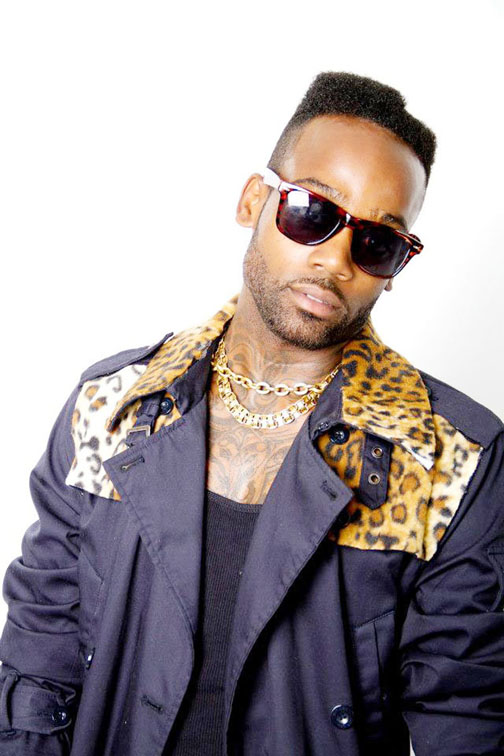From rags to riches, that’s the story of Abdullaw Shawnpey, a hip hop artiste who uses the struggles he once faced in life to motivate him towards his ultimate goal of becoming a great rapper.
Born Noel Shawn Pompey 32 years ago, he says poverty and neglect were his daily realities.
Growing up in Linden was not easy; he described it as rough and challenging but with perks at times. At the age of 11 he was homeless and he hung around the town’s market, picking up scraps of metal and bottles for a few cents to provide for his starving family at home. He had already dropped out of school.
 But for all the hunger and pain, he still tried to make the best of life. “[Childhood days] had its good times when I would be playing a lot of cricket and soccer on the streets,” he said. “I would watch all the big guys play basketball – I couldn’t play because I was too short but running and jumping was my thing. As for my family we were very loving, and because of the scarce resources we had to share everything, and that’s where I get my sharing attitude from even today.”
But for all the hunger and pain, he still tried to make the best of life. “[Childhood days] had its good times when I would be playing a lot of cricket and soccer on the streets,” he said. “I would watch all the big guys play basketball – I couldn’t play because I was too short but running and jumping was my thing. As for my family we were very loving, and because of the scarce resources we had to share everything, and that’s where I get my sharing attitude from even today.”
After gaining the trust of a local shopkeeper, he was soon entrusted to ‘manage’ the shop in the absence of the proprietor. This later landed him the opportunity to migrate to St Lucia with the shopkeeper to help in setting up a similar business in the island. At the age of 16, Shawnpey packed his bags and headed to the island-state, with his mother and siblings in mind. St Lucia gave him more prospects to develop himself as a youth; it was there that he began to love hip hop and later developed it when he migrated to the United States. This time he was able to take along his family that he sponsored.
The late Tupac Shakur was the inspiration behind Shawnpey. According to him, it was Shakur’s lyrical messages and style that made him love the art, want to develop music and be a hip hop artiste. Recording his first single, “Get Up Ghetto Youngsters” in St Lucia, gave him the energy and courage to further develop himself as a musician before launching himself in Guyana at the 1999 Kashif and Shanghai football tournament. During one of the game’s half-time shows Shawnpey was given the microphone to perform his single, which was well received by the spectators. He described it as an unforgettable, energetic experience that is the backbone of who he wants to be.
Persons he looks up to include Kashif Muhammad and Aubrey ‘Shanghai’ Major, Gordon Moseley and his brother Abdulla Hamid, among other people who support him. “Everyone who comes across my music and gives me the courage to continue is an inspiration to me,” he said.
 According to Shawnpey, his music comes from either experience or visions. “It’s either do it, done it or I’m about to do it. I feel stress-relieved, liberated… when I express myself. At the end of the day, it is a job well done.”
According to Shawnpey, his music comes from either experience or visions. “It’s either do it, done it or I’m about to do it. I feel stress-relieved, liberated… when I express myself. At the end of the day, it is a job well done.”
Most of his current YouTube songs, like any typical rap, are based on money, women and possessions. Some of his lyrics are controversial and even degrading, according to some bloggers on the site, but Shawnpey says he believes himself to be very liberal and progressive when it comes to music. After all, as he said, “It’s me talking about the stuff I have… because I knew where I came from and know where I am going. I want the world to see.” He went on to explain that this is where hip hop is today and he will flow with the times before setting a higher level. He does try to put a more positive vibe into his music and says in the future he will sing a lot more on empowerment.
Some of his hits include: “I’ll Go Get It”, which was produced by Dre Knight, who also worked with Frank Ocean, Sizzla and LL Cool Jay; and “Pay Day”, which was produced by Glen Mosley who also worked with Tyrese and Dr Dre, along with Chris Brown.
Abdullaw loves the genre not only because of its beats but the impact it has on his life. “I feel like that’s the genre for me. There is something about it that’s natural to me. It’s my beat to dance to; this is how I show my two steps.”
For his love for the music and his passion towards excelling, he sees himself winning Grammy awards, releasing platinum albums and enjoying success as he strives to put Guyana on the map. “I would like the Guyanese youths to actually support me, see me as a reflection of them. … my efforts should be able to motivate them to see where I came from and where I am today.”
He made a special call for promoters, studios and DJs to support local talent and even Guyanese art from the diaspora.
Shawnpey has three children: two boys and one girl aged ten, eight and four years old. He considers them to be his best work to date because, as he said, apart from security and comfort, he has been able to give them what he never had.
Shawnpey has a daytime job as a construction worker with a company that builds ‘green’ buildings in the US. When he is not working on his music he watches movies with his children, sports, or goes clubbing.
He promises Guyana a lot more when it comes to music. “With the support from the Guyanese public you can expect greatness. This support will encourage me to feed the market we have here and develop.”







